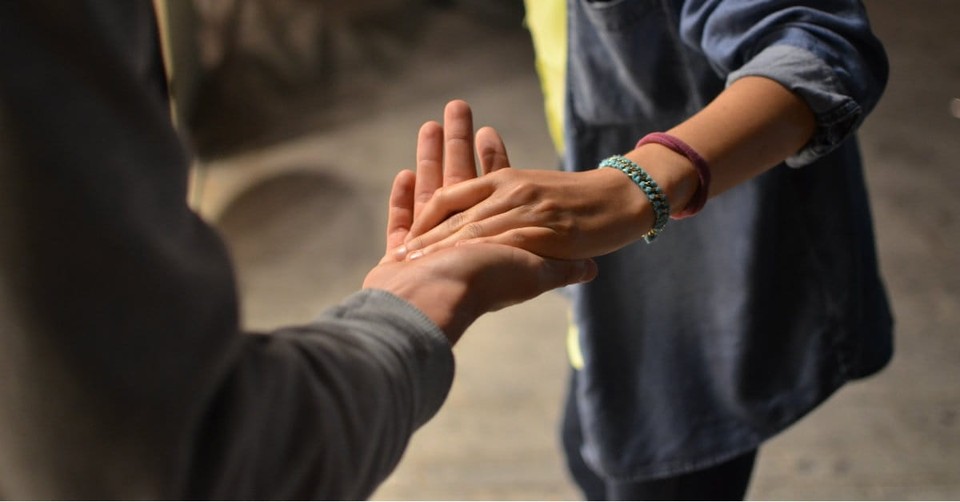3 Lies about Pornography That Could Be Destroying Your Marriage

Josh never thought he had a problem. He was like most other young teens who discovered porn while surfing online. I’ve got this, he told himself. No harm, right? No one will ever know. What he didn’t realize then was that as he entered his early twenties, what began as occasional browsing grew into full-blown addiction. As the stresses of his career and marriage increased, so did his dependence on porn. When his wife discovered his secret, his addiction was exposed, leaving him no choice but to address the role of pornography in his life.
There are currently over 24.5 million different pornographic websites on the Internet, which represents approximately 12% of all websites. What’s more, at any given time, approximately 30,000 people are looking at porn.
Here are 3 lies we believe about pornography that could be destroying our lives and our marriages.
Photo Credit: ©Pexels
Lie #1: Porn addiction in marriage isn't that big of a deal
We tell ourselves, ‘boys will be boys.’ Generations of men and women dismiss the magnitude of the problem with porn because they view it as a rite of passage. They remember looking at magazines in their friend’s backyard and see it as a harmless pastime.
It’s not a harmless pastime. It wasn’t then and it certainly isn’t now. The size and scope of pornography usage is staggering. According to Barna Research, 62% of men who claim to be Christian view pornography at least once a month. This is nearly two out of three Christian men.
Yet, this isn’t just a male problem. Barna’s research also shows that more than 15% of Christian women view pornography at least once a month. What this percentage doesn’t factor in are the countless women who regularly report reading erotica and explicit romance novels that depict graphic fantasies for the reader.
Research is also revealing that younger generations of Americans—particularly those who accessed the internet during adolescence—have shown the greatest increase in pornography use over the past few decades. According to a Pure Passion – Mastering Life Ministries, a recent Symantec-funded study found that "Among kids seven and under, the fourth-most-sought search term (after Youtube, Google, and Facebook) was ‘porn.’ Even more surprisingly, these kids are more curious about porn than their older siblings: for teens, porn was sixth; for tweens, eleventh."
Because porn addiction has a similar neuronal pathway to drug addiction, porn users are likely to develop dependence and tolerance, requiring the consumption of increasingly graphic and atypical sexual material in order to get the same high as they did previously. This can lead to desensitization as well as antisocial sexual behaviors including rape, physical assault, promiscuity, and the normalization of violence towards women.
The truth: Pornography is a big deal. Its usage isn’t declining within the Christian community. On the contrary, it is rising and it is entrapping individuals at younger ages than ever before. God wants His people to be ‘set apart,’ ‘pure,’ ‘undefiled.’ He wants us to be able to enjoy sex in our marriages the way He intended—as an intimate, beautiful reflection of His love for us.

Lie #2: Pornography helps increase intimacy in marriage
For years, many in the field of psychology downplayed the negative effects of pornography, suggesting porn could be normal, even healthy. Many marriage counselors encouraged couples to accept porn use, some even recommending it in the hopes of increasing intimacy for couples who were struggling. However, in an open letter to readers in 2016, leading relationship researcher Dr. John Gottman corrected his previous recommendation and now stands by research that indicates porn is indeed destructive to intimacy.
The statistics fully support his findings. Psychology Today reported testimony from a 2004 Senate hearing where Dr. Jill Manning shared her findings that 56% of divorce cases involved one party having an obsessive interest in pornographic websites.Another source, the American Academy of Matrimonial Lawyers, polled 350 divorce attorneys in 2003 where two thirds of them reported that the Internet played a significant role in the divorces, with excessive interest in online porn contributingto more than half of such cases.
The reason is that sex was intended to be between one man and one woman, within the safety and commitment of marriage, to keep them facing each other, working with each other, united in body, soul, and mind. Sex was God’s great gift for couples to enjoy each other and find both deep connection and satisfaction with each other. True intimacy involves both knowing and being fully known by another.
To the contrary, pornography steals intimacy and fosters dissatisfaction in couples. Cynical attitudes about love emerge, leading people to believe that the best sexual experiences can be attained without affection or love. For many, porn use becomes an easy means of escaping the challenges of marriage and prepares them to disinvest in their marriage.
In her book, Pornified, Pamela Paul notes that "Pornography gives men the false impression that sex and pleasure are entirely divorced from relationships." Porn creates an entirely self-centered sexual experience because it doesn't require that husbands be lovers of their wives. Gratification is quick, easy, always guaranteed. Intimacy is abandoned as a goal in favor of personal pleasure. It substitutes loving our mate for loving ourselves.
The truth: Porn use destroys marital intimacy and significantly increases the chances that your marriage will end. We must remove anything the enemy could use to get a foothold into our lives, our homes, our marriages, and our families. We must protect the very relationship we value most. God wants to heal marriages. He desires to restore and redeem everything that Satan has tried to destroy. He can bring more intimacy and satisfaction than we ever thought possible.
Photo Credit: ©Thinkstock/Voyagerix

Lie #3: Porn addiction in marriage helps people stay faithful to their spouses
In my clinical practice, couples often report using pornography as a way to spice up their sex lives and strengthen their connection in order to prevent them from moving outside the relationship for sexual satisfaction. What they ultimately find, however, is that it actually breeds problematic sexual encounters and a growing distance in their relationship.
The reason is as with any other addiction, the stimulus that creates arousal at first works less over time and requires more intense, more heightened pornographic images. Dr Gottman describes,
With pornography use, much more of a normal stimulus may eventually be needed to achieve the response a supernormal stimulus evokes. In contrast, ordinary levels of the stimulus are no longer interesting. This may be how normal sex becomes much less interesting for porn users. The data supports this conclusion. In fact, use of pornography by one partner leads the couple to have far less sex and ultimately reduces relationship satisfaction.
Research done by Steven Stack of Wayne State University showed that pornography use increased the marital infidelity rate by more than 300 percent. Another study found a strong correlation between viewing Internet pornography and sexually permissive behavior. With regular porn use, couples report experiencing increased depression, anxiety, and a whole host of trauma-related illnesses and decreased safety and trust in the relationship. They begin to view the institution of marriage as sexually confining,diminishing the belief in the importance of marital faithfulness,and intensifying doubts about the value of marriage itself.
John 8:44 tells us that Satan is the ‘father of lies.’ He is using pornography to entice couples to forsake the real, intimate connection found in marriage in exchange for a cheap counterfeit that porn provides.
The truth: Pornography doesn’t help couples stay faithful. It destroys the emotional safety in the marriage and in many cases, leads to increased infidelity as well as the breakdown of the marriage. Couples need to be taught from the pulpit and in Bible Studies the facts about what God desires for their marriages. We need to be equipped, strengthened, and fortified so we can protect our marriages and our families.

How To Take Back Your Marriage
Change always starts with us as individuals. Each of us must look within our heart to understand the impact pornography has had on our view of ourselves and our marriage.
Couple's therapist Laurie Watson writes in Psychology Today “Making love is hard. Sexuality is complex and complicated, relational and physical for us.… But sex is glue in a marriage — in fact, it's cement. There's unparalleled joy in feeling connected to another real person through deep physical intimacy. Sex is the pinnacle of this connection, and it requires a man — a real man — to negotiate the rigorous landscape of making love to a real woman.”
Sex takes hard work in a marriage. At times, learning to navigate the complex dance of the sexual relationship can prove challenging, but if we want the deepest kind of intimacy with our spouse, it will require us to come face to face with our spouse and begin sharing openly and honestly. It will demand each of us as individuals to look at our own historic wounds and vulnerabilities in order to address them, heal them. Find freedom from them.
James 5:16 (ESV) tells us “Therefore, confess your sins to one another and pray for one another, that you may be healed. The prayer of a righteous person has great power as it is working.”
The truth is, as long as your porn usage stays hidden in your life or marriage, you will never find freedom, nor will you experience the true intimacy you desire most. Many struggle yet walk away from the reality of what’s destroying their marriage—uncertain of what change will look like, or perhaps unable to believe that life really could look different.
If you struggle with pornography in your life or your marriage, take the next step now. Bring it into the light. Porn requires darkness and secrecy to maintain its hold on you. The light is where God dwells, where healing happens, and where new life begins.
Ephesians 5:13-14 encourages us “But when anything is exposed by the light, it becomes visible, for anything that becomes visible is light. Therefore it says, 'Awake, O sleeper, and arise from the dead, and Christ will shine on you.’”
Related Resource: Listen to our new, FREE podcast on marriage: Team Us. The best marriages have a teamwork mentality. Find practical, realistic ideas for strengthening your marriage. Listen to an episode here, and then head over to LifeAudio.com to check out all of our episodes:
Photo Credit: ©Pexels/Snapwire

Where Can I Get Help?
The great news is whether the pornography usage in your marriage reaches the level of addiction or not, you can change your relationship with porn and change your life.
There are resources and websites that can help both of you to be accountable to each other like Covenant Eyes or Pure Passion: Mastering Life Ministries, which are both dedicated to helping individuals and couples find freedom from pornography and addiction. Find a strong Christian therapist to help you and your spouse learn to communicate about sex, deal with pornography abuse and/or addiction, and learn to engage sex in a deeply intimate, yet healthy way.

Photo Credit: ©Thinkstock/jacoblund
Originally published February 17, 2021.








